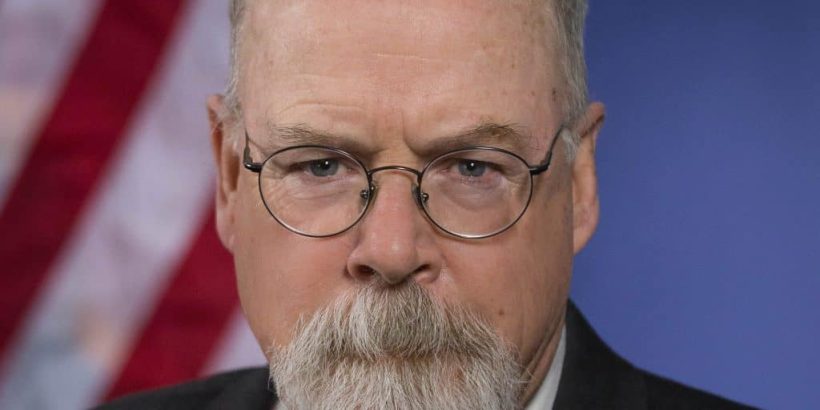April 25, 2022 Katabella Roberts
Special counsel John Durham has issued trial subpoenas for Hillary Clinton’s 2016 campaign, the Democratic National Committee (DNC), Fusion GPS, and Perkins Coie as he continues to prosecute his findings as special counsel, from which he charged cybersecurity lawyer Michael Sussmann, who in 2016 represented the Clinton campaign, with lying to the FBI.
Hillary Clinton’s 2016 campaign, the DNC, Washington-based private intelligence firm Fusion GPS, and law firm Perkins Coie, Sussmann’s former employer, meanwhile, are trying to fend off Durham’s efforts to compel them to hand over previously withheld documents.
The campaign and Sussmann’s lawyers argue that attorney-client privilege should allow them to keep the records concealed.
Durham, who was tasked around March-May 2019 with reviewing the origins of the 2016-2017 FBI investigation of the now disproven Trump–Russia collusion narrative, says his investigation has led him to believe that the Clinton-allied groups played a coordinating role in pushing the false claims.
In May 2017, special counsel and former FBI head Robert Mueller ultimately found no Trump-Russia collusion to sway the 2016 election.
On April 23, Durham said of the groups, “meeting to agree on the express goal of a joint venture is precisely what happened here, on more than one occasion.”
The special counsel said that “Tech Executive-1” Rodney Joffe, “Originator-1” April Lorenzen of the information services firm Zetalytics, and other researchers started to discuss “searching for and collecting derogatory internet data about the online activities of Donald Trump and his associates” in June 2016.
Lorenzen “assembled and shared initial purported data” with Joffe, “who, in turn, shared the data” with Sussmann, Durham added.
“The joint venture continued and crystallized early in August 2016,” when Sussmann, Joffe, and “agents of the Clinton Campaign” met, Durham said, while citing an Aug. 12, 2016, meeting where Sussmann, Joffe, Marc Elias (former Perkins Coie partner), and the co-founder of Fusion gathered in Elias’s office to discuss “the same Russian Bank-1 allegations that the defendant would later bring to the FBI.”
“The parties agreed to conduct work in the hope that it would benefit the Clinton Campaign, namely, gathering and disseminating purportedly derogatory data regarding Trump and his associates’ internet activities,” Durham wrote.
“The evidence will show that as a result of these conversations and during this same time period, Tech Executive-1 did exactly that: he tasked employees from multiple Internet companies and a university working under a pending national security contract to mine and gather vast amounts of internet metadata in order to support an ‘inference’ and ‘narrative’ tying the candidate [Trump] to Russia.”
Durham went on to add that Joffe continued the “joint venture” via an Aug. 17, 2016, call with Sussmann and Elias, an Aug. 19, 2016, meeting with Sussmann and Elias, and a Sept. 8, 2016, call and meeting with Sussmann.
All of these, Durham said, citing calendars he has viewed, were billed to the Clinton Campaign by the defendant.
Durham further stated that Joffe also requested the CEO of an internet company to mine and analyze huge amounts of internet traffic for derogatory information regarding Trump and his associate’s online communications and internet connections.
Joffe also sent the CEO of the internet company a list containing private information, such as email addresses, IP addresses, and physical addresses of multiple Trump associates, many of whom were being researched by Fusion, Durham said.
Joffe had made clear his desire to ensure that Perkins and the Clinton campaign would be “happy” with the information he had discovered, Durham added.
Sussman was indicted in September 2021 for lying to the FBI when he claimed he had information about an alleged secret communication channel between Trump and a Russian bank; claims which ultimately proved to be false.
Sussman allegedly told then-FBI General Counsel James Baker in October 2016, while making the claims of alleged communications, that he was not representing any client, while he, in fact, was billing the time to the Clinton campaign.
Following the subpoenas, lawyers for Sussman moved to prevent materials being admitted in the case with their argument that they are protected by attorney-client privilege. They’ve called Durham’s subpoenas “astonishing and legally inappropriate.”
“The Special Counsel continues to overreach: he seeks to admit evidence that the law squarely forbids, he seeks to prove unduly prejudicial allegations he has not charged, and he seeks to prove conduct that is utterly irrelevant to the one discrete crime he has charged,” the lawyers said.
Durham disputes that.
He maintains that “the goal of the joint venture could not have been more clear: it was to gather and disseminate derogatory non-public information regarding the internet activities of a political candidate and his associates,” he wrote in a April 23 court filing.

